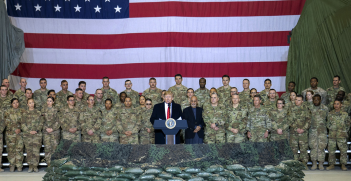UAE-Israel Deal Reflects Shifting Domestic and Regional Political Priorities

The “breakthrough” deal for Arab-Israeli peace is more a symbolic announcement designed to satisfy domestic political interests in each state. Regional reactions to the deal will tell us more about the long-term prospects for peace.
On 13 August 2020, US President Donald Trump, Israeli Prime Minister Benjamin Netanyahu, and Abu Dhabi Crown Prince Mohammed bin Zayed al-Nahyan (popularly known as MBZ) announced the full normalisation of relations between Israel and the United Arab Emirates (UAE). In exchange, Israel will suspend plans for annexation of around 30 percent of the territory in the West Bank.
A breakthrough deal?
The deal is historic in that the UAE is the first Arab state to normalise relations with Israel in almost 30 years, following Egypt in 1979 and Jordan in 1994. It also marks a challenge to the 2002 Arab Peace Initiative (API), in which Arab states declared they would only normalise relations after the establishment of a Palestinian state. US Secretary of State Mike Pompeo called the deal “a significant step forward for peace in the Middle East,” and Jared Kushner labelled it a “breakthrough.”
But is “breakthrough” the right term here? The deal doesn’t actually change much on the ground. It opens additional avenues for technological and economic cooperation between the UAE and Israel, but their collaboration in these areas was already increasing, and high-level contacts were already routine. The UAE has argued the deal is critical to stop Israel’s annexation of the West Bank, but Netanyahu has since clarified that the annexation plan has only been “temporarily halted.” There is also nothing in the deal to prevent Israel’s informal construction of settlements in the West Bank, which has previously made the traditional two-state solution, with a Palestinian state spread across the West Bank and Gaza, increasingly untenable. There’s a lot to unpack here.
A win for Israel
The UAE-Israel deal is a symbolic victory for the Israelis who have long maintained that normalisation of relations with Arab states must precede, rather than follow, peace with the Palestinians.
The deal also presents a win for Netanyahu as he seeks to shore up support among his conservative base. Netanyahu first announced the annexation plan in May 2020, in the context of a domestic political crisis and corruption trial that made him the first sitting Prime Minister to face criminal charges in Israeli history. But annexation was not a priority for Israelis concerned with the threat of COVID-19 and associated economic fallout. By July, both the US Administration and Netanyahu’s rival-turned-alternate-Prime Minister Benny Gantz had cooled significantly on the prospect of annexation occurring in 2020. Ironically, the UAE-Israel announcement has resulted in a renewed push from right-wing politicians and settler groups to keep the annexation plan alive, prompting Netanyahu to state that: “There is no change in my plan to apply sovereignty, our sovereignty, in Judea and Samaria, in full coordination with the US.”
The deal also helps Netanyahu distract from a fractured partnership between himself and Gantz which has led to a stalemate over Israel’s budget, and may take Israel into its fourth election in two years. Internationally, it reinforces Netanyahu-Trump relations, allowing the Trump Administration to claim they are making progress on Middle East peace ahead of the November 2020 Presidential elections.
UAE’s Assertive Foreign Policy
Historically, normalisation in the Arab states has been viewed as a betrayal of the Palestinian people and resulted in popular uprisings. But Abu Dhabi has clearly judged that the importance of the Palestinian issue has weakened among younger generations. The UAE is also a highly centralised authoritarian state – they have a great deal of autonomy on foreign affairs and have proven adept at silencing domestic criticism. Middle East Monitor claims that the UAE has already arrested scores of Emiratis, Palestinians, and Jordanians resident in the UAE for opposing the deal, and the reaction on Emirati Twitter has been similarly muted.
In terms of benefits for the Emiratis, the deal reflects shared threat perceptions between the UAE and Israel on a number of regional actors, and enables more public cooperation on security issues. Iran’s revolutionary rhetoric and Turkey’s vocal support of the Muslim Brotherhood are interpreted as major threats to the Emirati regime, particularly as the Muslim Brotherhood remains one of the few potential domestic sources of unrest in the poorer Emirates. Netanyahu and de-facto UAE ruler Mohammed bin Zayed Al Nahyan (MBZ) align in their hawkish approach to Iran and shared frustration over attempts by Iran and its proxies to undermine stability in Iraq, Lebanon, Syria, and Yemen. Under MBZ the UAE has also pursued an assertive regional foreign policy, reinforcing secular authoritarianism and empowering allies such as General Khalifa Haftar in Libya to counter Islamist actors. Haftar has been beset by setbacks in Libya over the past six months, and Turkish-UAE rhetoric over Libya has become significantly more heated. While Israel’s economic ties with Turkey remain strong, Turkish Prime Minister Recep Tayyip Erdoğan has increasingly aligned with the Palestinian cause, angering Netanyahu.
Iran and Turkey have already expressed their displeasure with the UAE-Israel deal. Iran’s Foreign Ministry described it as an act of “strategic stupidity” and a “dagger that was unjustly struck by the UAE in the backs of the Palestinian people and all Muslims,” whereas the Turkish Foreign Ministry said they “will never forget and will never forgive this hypocritical behaviour.”
There are other rewards in the mix for the Emiratis too. Netanyahu has denied that he gave support for the US sale of F-35 fighter jets to the UAE as a reward for signing the normalisation deal, but the Trump administration appears to still be considering it despite Israeli opposition. The agreement provides an opportunity to deepen ties not only with the Trump administration, but also to take credit for the delay to Israel’s annexation plans — a step that ingratiates them with US presidential candidate Joe Biden.
Will other Arab states follow suit?
The UAE’s actions have driven speculation about the possibility of normalisation, or even a strategic alliance, between Israel and other Arab states. But the prospects for a formal strategic alliance are still remote. Jared Kushner has claimed Oman and Bahrain would soon follow the UAE in normalising relations with Israel, and Trump said that he expects Saudi Arabia to join too. The Egyptian, Bahraini, and Omani regimes quickly expressed support for the UAE-Israel deal, but Saudi Arabia’s backing would be a major coup for the Israelis.
However, Saudi Arabia has since clarified that it will not establish diplomatic ties until Israeli-Palestinian peace is achieved, although their Foreign Minister did cautiously say that the deal “could be viewed as positive.” Saudi Arabia also ran a series of soap operas over Ramadan (April to May 2020) on state-owned television network MBC that unusually broached themes of Israeli-Arab relations and normalisation, potentially as a litmus test for Saudi popular reactions.
Following the UAE-Israel announcement, the hashtag #التطبيع_خيانة (normalisation is betrayal) trended in Saudi Arabia, Oman, Kuwait, Bahrain, and Qatar. Gulf civil society groups from across the political spectrum decried the deal, including a group of 20 academics, lawyers, and media figures from the UAE. In Sudan, a foreign ministry spokesman was fired after he said he was looking forward to a peace deal with the Israelis. Even Oman’s Grand Mufti pushed back, declaring that the liberation of al-Aqsa mosque is a “sacred duty.”
Nonetheless, the UAE’s announcement “breaks the ice” and allows other Arab states who have been privately involved in negotiations with Israel to evaluate popular reactions and consider whether they should follow suit. US Secretary of State Mike Pompeo is already on the ground in the Middle East to promote this expansion of the deal.
Unfortunately for the dealmakers, popular reactions and lobbying by the Palestinians appears to be making headway. Moroccan Prime Minister Saadeddine Othmani directly rejected speculation about Morocco-Israel normalisation, saying that support of the Palestinians was a “red line.” Upon Pompeo’s arrival in Manama, Bahraini Crown Prince Salman bin Hamad Al Khalifa emphasised not normalisation but the importance of the API and a two-state solution. In Sudan, too, Pompeo was rebuffed.
But even if other Arab states do sign up to the deal in coming weeks or months, one actor remains conspicuously absent — the Palestinians.
Dr Jessie Moritz (@JessieMoritz) is a Lecturer at the Australian National University and specialist on the political economy and international relations of the Arabian Peninsula.
This article is published under a Creative Commons Licence and may be republished with attribution.





